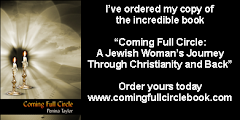

I just don’t understand it. Call me naïve, call me an optimist, but I believe that all Jews are supposed to be on the “same team”. Sure, we’re all different. Some of us are more religious, some of us have all but a very tenuous connection to our Judaism, but we are all Jews. Among the religious, this feeling of “achdut” or brotherhood should be even stronger. Yes, some of us are Chassidic, some litvish, some yeshivish, some dati, but we are all G-d fearing Jews.
We are all supposed to be working towards the same goal – to bring holiness down to this world, preparing a place for the ultimate redemption – the coming of mashiach, meanwhile working on our own holiness and relationship with Hashem. A tall order to be sure, and we all approach the process in different ways, but we shouldn’t be sabotaging each other in the process.
This past week I became aware of an Orthodox Jewish woman who is also a “blogger”. I had never heard of her before but in my inbox, under “google alerts” was an alert about messianic Judaism that I decided to follow. There, for the entire world to see, on a Hebrew Christian website was a quote of this Orthodox Jewish blogger who was writing some very negative things about me. I suppose that the most confusing thing was that this woman doesn’t even know me.
Jewish law has a lot to say about “loshon hara” (literally, evil speech – gossip) and the consequences of engaging in such activities are grave, indeed. But one of the things about loshon hara is that it must be true. Many people think that loshon hara is telling lies about another person, but it’s not. That’s called “motzei shem ra” – this also has dire consequences, but is a different thing. While it could be said that loshon hara is a more serious sin, motzei shem ra has far more devastating consequences. How?
It is said that the reason that the second beit hamikdash (temple) was destroyed was for “sinat chinam” or baseless hatred. At the time, there was so much infighting and sinat chinam among the Jewish people, that our behavior towards each other resulted in the destruction of our holiest site and the worst exile in our 4000 year history. It is said that if we have not merited to see the temple rebuilt in our generation, then we are as guilty of its destruction as those who lived to see it happen.
When a person speaks loshon hara, they speak true words, even though they are negative. It could be said, then, that there is a “basis” for such speech, albeit still forbidden. However, when someone speaks motzei shem ra, they do not speak the truth and there is no basis for such negative speech – baseless hatred. Perpetuating negative speech which is untrue is a major contributor to our continued exile and why we must continue to pray for the coming of mashiach.
May this be the year that we overcome the temptation to speak of our fellow Jews negatively, that we learn the true meaning of “teamwork” and that we merit to see the coming of mashiach and the end of our exile!
Kativa v’chatima tova l’kulam – may we all be written and sealed for a good year!




